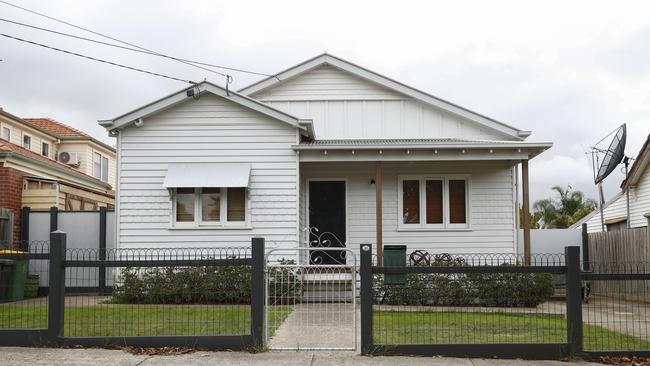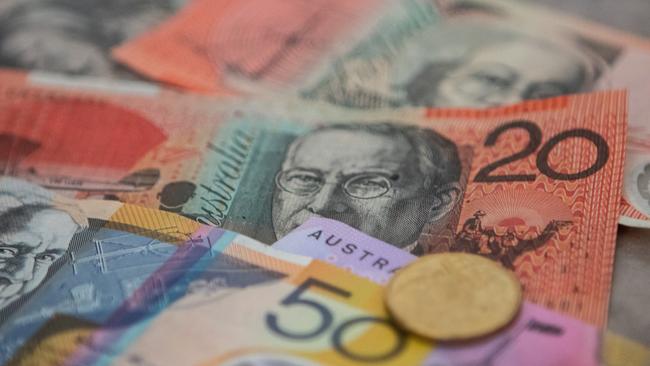ANZ calls for mortgage interest rates to rise after inflation spikes 5.1 per cent
The cash rate is set to rise for the first time since the end of a pandemic, spelling gloom for the government in the run-up to the federal election.
National
Don't miss out on the headlines from National. Followed categories will be added to My News.
One of the nation’s most respected economists has warned of an immediate series of rate hikes that will rise “more aggressively than initially thought likely” — after woeful new inflation data released today.
Major banks and financial institutions are calling on the Reserve Bank to raise the target cash rate next week, to as high as 0.5 per cent -- an 0.4 per cent increase — after CPI data released today showed a record 5.1 per cent annual inflation rate.
It would be the first time since 2007 that the central bank raises rates during a federal election campaign, which the incumbent Howard government lost.
Stream more finance news live & on demand with Flash. 25+ news channels in 1 place. New to Flash? Try 1 month free. Offer ends 31 October, 2022 >

The AMP’s chief economist Shane Oliver says that he expects the RBA to raise rates next week to 0.5 per cent.
“We now expect the RBA to start hiking at its May meeting next week and by 0.4 per cent, which will take the cash rate to 0.5 per cent. The latest inflation blowout adds significant pressure on the RBA to immediately start raising rates and to do so more aggressively than initially thought likely.”
“A cash rate target of 0.1 per cent is inappropriate against this backdrop,” says economists from the ANZ.
“There is a clear risk the RBA raises the cash rate at the May board meeting next week. Indeed the inflation data today indicates that the RBA should raise the cash rate,” says Gareth Aird, head of Australian economics at Commonwealth Bank.
“These numbers are well outside the RBA’s inflation target of 2-3 per cent, so a cash rate hike next Tuesday is now very likely. If the RBA doesn’t move the cash rate next week, it could be accused of letting an election get in the way of what numbers are telling it to do,” says Canstar’s Effie Zahos.
An interest rate hike next week would almost certainly see mortgage and debt repayments costs rise.
This would only be the second ever interest rate hike during an election campaign and could spell doom for the incumbent Coalition government, as voters head to the polls encumbered by more burdensome loan repayments and rising cost-of-living pressures.
Consumer prices surged by 2.1 per cent during the March quarter, with the annual rise now at a more-than 20-year peak of 5.1 per cent, easily outstripping what the market expected on Wednesday.

Treasurer Josh Frydenberg said the figure was a reminder that Australians lived in a “complex and volatile economic environment” and he pointed to the war in Ukraine as a key reason that fuel prices, for example, have leapt 11 per cent.
A rate rise next week would go against previous hesitancy expressed by the RBA, most recently in minutes from its early April meeting.
“Over coming months, important additional evidence will be available on both inflation and the evolution of labour costs. Consistent with its announced framework, the Board agreed that it would be appropriate to assess this evidence and other incoming information as it sets policy to support full employment in Australia and inflation outcomes consistent with the target,” the Board’s minutes read.
The Commonwealth Bank said it believes that the RBA will not raise rates next week.
“If the RBA lifts the cash rate at the May Board meeting next week they will have reneged on what they said just last week – namely that the Board agreed that it would take into account evidence on both inflation and the evolution of wages costs as it sets policy.”
The ANZ conceded there may still be a chance of this, but said that it still believes that the RBA will raise the target next week.
“We are conscious the RBA’s April meeting minutes highlighted the desire to be ‘consistent with its announced framework’ and wait for data on ‘the evolution of labour costs’ before it moves. So the RBA could still hold out for the labour market data and make its first move in June.”
David Plank, Adelaide Timbrell, and Arindam Chakraborty, the ANZ economists, nonetheless predicted that the target cash rate will be 0.5 per cent by the end of June.
“The move in May will likely be followed by an increase of 0.25 per cent in June, taking the cash rate to 0.5 per cent.
“Regardless of whether the RBA’s first move is in May or June, we expect the cash rate target to be at 0.5 per cent by early June.”
A rate rise could land a heavy blow to the Coalition’s re-election chances. In 2007, then Prime Minister John Howard was forced to apologise for the rate rise three weeks before the election he later lost to Kevin Rudd.
“I would say to the borrowers of Australia who are affected by this change that I am sorry about that and I regret the additional burden that will be put upon them as a result,” Mr Howard said at the time.
The Reserve Bank governor Philip Lowe has previously expressed that he thought it “appropriate” not to raise rates at the time.
“The approach that we are running at the moment, waiting for the evidence, does run the risk that inflation will be above 3% for a period of time and that risk is acceptable – we think running that risk is an appropriate thing to do,” he said in February.
Originally published as ANZ calls for mortgage interest rates to rise after inflation spikes 5.1 per cent


